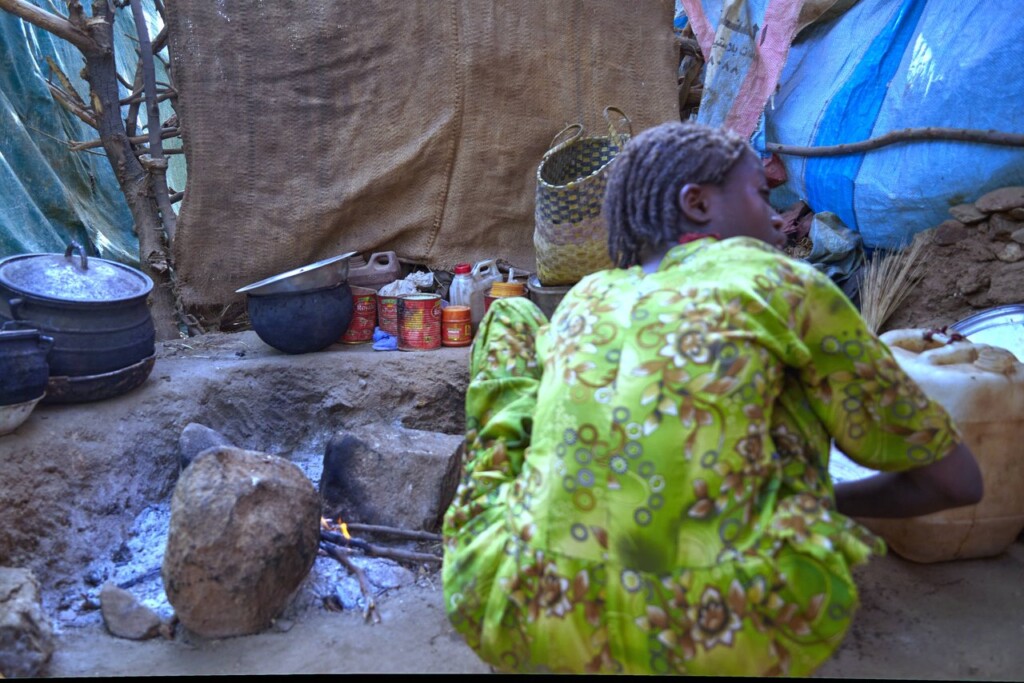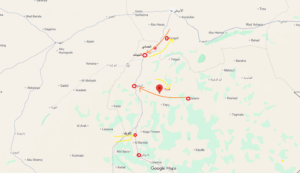‘Two to three children buried daily’ in Sortony camp as famine looms over Darfur

A displaced woman in Sortony camp, North Darfur (RD)
Since famine was declared in Zamzam camp in El Fasher, the capital of North Darfur, similar conditions have been reported in displacement camps throughout the Darfur region. Families share their food rations to manage one meal a day, amid harrowing reports of daily deaths due to malnutrition affecting all age groups.
Darelnaeem Idris, along with her neighbours Maryam and Umelhasan, share a single kitchen where they gather ingredients for their daily meals to feed their seven children. They live in Sortony camp, south of Kabkabiy town in North Darfur, where living conditions do not allow each family to prepare meals separately.
Idris, an activist, explained to Radio Dabanga how she provides food for her children. “We can no longer feed our children alone, so my neighbours and I help each other. One brings flour, another brings oil and onions, and we all contribute vegetables. Our children eat once a day at noon and then wait until the next day.”
This cooperative effort is a lifeline for thousands of displaced people in Sortony camp, who are facing severe food shortages. Idris said that the lack of food and the inability to sustain livelihoods has forced many in the camp to share resources.
Sortony camp, approximately 110km west of El Fasher, is newer than other camps in the area. It was established in March 2016, after thousands of people, who fled fighting in the Jebel Marra massif between the Sudanese Armed Forces (SAF) and rebel fighters of the Sudan Liberation Movement faction led by Abdelwahid El Nur (SLM-AW), sought refuge near a UN-AU Mission in Darfur (UNAMID) peacekeepers base in the vicinity of Sortony village in Kabkabiya.
The influx of over 10,000 displaced people since the outreak of war on April 15, 2023, has increased the camp’s population to more than 42,000, straining resources further.
The situation in the camp is said to be on the brink of a complete famine. The United Nations declared a famine in Zamzam camp, south of El Fasher, in early August. The General Coordination for Displaced Persons and Refugees has stated that conditions in all 171 displacement camps in Darfur are similar to those in Zamzam. The World Food Programme (WFP) warned that famine-like conditions are expected in 13 other regions in Sudan, including Khartoum, El Gezira, Kordofan, and Darfur.
Malnutrition
Mohamed Bashar, who works at the humanitarian affairs office in Sortony camp, corroborated the testimony of Idris. “The situation here mirrors that of Zamzam camp. The increase in displaced people has pressured the existing population, but we have shared what little we have.”
Bashar warned of increasing cases of malnutrition, particularly among children and the elderly. “Every day, I see 20 to 30 children at the Médecins Sans Frontières (MSF/Doctors Without Borders) centre due to malnutrition. We bury two to three children daily,” he said.
Idris confirmed the widespread malnutrition and the lack of medical aid. “The sole MSF centre only provides consultations, with patients often unable to afford medicines nearby towns. Locals resort to traditional remedies using tree roots, trunks, and leaves.”
Shelter
Since the outbreak of the current war between the Sudanese Armed Forces (SAF) and the Rapid Support Forces (RSF), Sortony camp has received over 10,000 displaced people, mostly from El Fasher. Adam Bashar, a member of the camp administration, noted that they provided shelter in schools and mosques, but recent heavy rains caused significant damage. “Over 300 homes collapsed, leaving hundreds of families exposed to the elements.”
Bashar added that while security has stabilised due to efforts by the SLM-AW, the arrival of goods has been hampered, leading to a living crisis. Food supplies have vanished from the Sortony market, and prices have soared beyond the displaced people’s means.
The Integrated Food Security Phase Classification (IPC) report warns that the situation could worsen between August and October 2024 due to continued lack of food, increased risk of infectious diseases, and limited access to healthcare and nutrition services.











 and then
and then